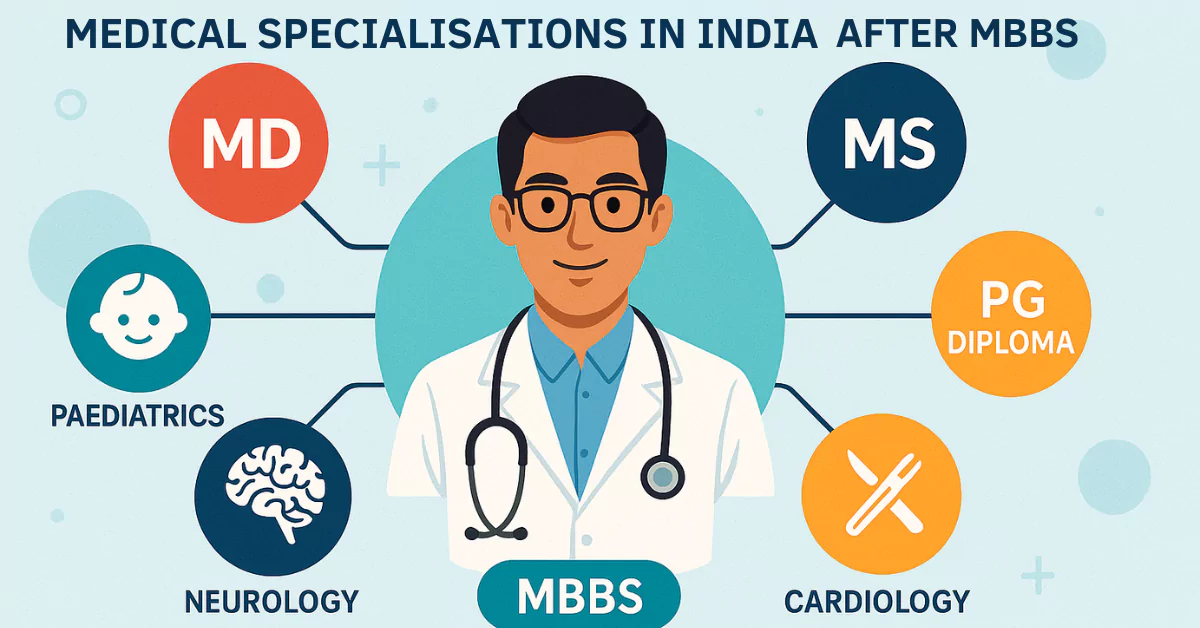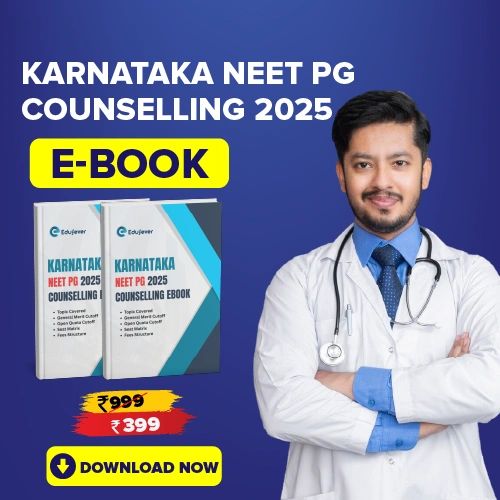After completing an MBBS degree, many medical students face an important decision:
“Whether to start practising medicine or to specialise in a particular field?”.
It can be a very challenging decision to make, as there are more than 60 specialties and over 30 subspecialties to choose from after MBBS.
Specialisation means focusing on one area of medicine and becoming an expert in it.
This choice is important because the medical field is highly competitive, and a postgraduate degree often improves career prospects.
Why NEET PG Specialisation After MBBS?
- Specialising after MBBS in India helps doctors gain in-depth knowledge and advanced skills in a specific branch of medicine.
- It improves career opportunities, allows them to handle complex cases, and often leads to higher salaries.
- Specialisation also meets the growing demand for expert doctors in fields like cardiology, neurology, and surgery, ensuring better patient care and professional growth.
- India produces the highest number of doctors in the world.
- However, the number of available postgraduate seats for specialisation is much less than the number of MBBS graduates.
- As healthcare needs grow with the increasing population, the demand for specialists also rises.
- Therefore, many MBBS graduates choose to pursue further studies to improve their skills and job opportunities.
MD/MS/Diploma/DNB Medical Courses
Postgraduate medical education in India mainly includes MD, MS, PG Diploma, and DNB courses. These courses help students gain in-depth knowledge, practical skills, and research experience in their chosen specialty. The curriculum usually covers:
- Theoretical knowledge
- Clinical and practical training
- Thesis writing
- Communication skills
- Research methodology
To get admission into these courses, students must clear entrance exams like NEET-PG, PGIMER, JIPMER PG, or AIIMS PG.
Doctor of Medicine (MD)
If you want to become a physician and treat a wide range of patients without focusing on surgery, MD courses are ideal.
| NEET PG Counselling Guide 2025 | |
|---|---|
| MCC NEET PG Counselling Guide eBook 2025 | 📥 Download |
| DNB Counselling Book 2025 | 📥 Download |
You can choose any of the following MD courses:
- MD in Anatomy
- MD in Anaesthesia
- MD in Aerospace Medicine
- MD in Biochemistry
- MD in Paediatrics
- MD in General Medicine
- MD in Forensic Medicine
- MD in Geriatrics
- MD in Radiodiagnosis
- MD in Dermatology
- MD in Ophthalmology
- MD in Radiotherapy
- MD in Sports Medicine
- MD in Respiratory Medicine
- MD in Psychiatry
- MD in Nuclear Medicine
Master of Surgery (MS)
MS is for those who want to specialise in surgery. This field requires strong physical and mental stamina, discipline, and excellent skills.
Some common MS specialisations are:
- MS General Surgery
- MS Orthopedics
- MS ENT (Ear, Nose, Throat)
- MS Ophthalmology
- MS Obstetrics and Gynaecology
Postgraduate Diploma
Apart from MD/MS, you can also choose to pursue Post-Graduate (PG) Diploma courses.
- Duration: 2 years
- Note: Compared to MD/MS and DNB degrees, diploma programmes are generally less preferred and carry lower recognition in most medical institutes.
Available PG Diploma Courses:
- PG Diploma in Clinical Pathology
- PG Diploma in Anaesthesia
- PG Diploma in Health Education
- PG Diploma in ENT
- PG Diploma in DVL (Dermatology, Venereology & Leprosy)
- PG Diploma in Occupational Health
- PG Diploma in Obstetrics & Gynaecology
- PG Diploma in Physical Medicine & Rehabilitation
- PG Diploma in Pulmonary Medicine
- PG Diploma in Sports Medicine
- PG Diploma in Hospital Administration
- PG Diploma in Immunohematology
- PG Diploma in Microbiology
- PG Diploma in Paediatrics
- PG Diploma in Psychiatry
- PG Diploma in Pathology
- PG Diploma in Nuclear Medicine
- PG Diploma in Radiotherapy
Diplomate of National Board (DNB)
DNB courses are postgraduate qualifications offered by the National Board of Examinations in Medical Sciences (NBEMS).
DNB Counselling is held for admission to the Diplomate of National Board (DNB) courses after MBBS or diploma courses. By passing the DNB exam, you can apply for medical or surgical super-specialisation courses.
Medical super-specialisations include fields like:
- Cardiac Anaesthesia
- Neurology
- Cardiology
- Neonatology
Surgical super-specialisations include fields like:
- Neurosurgery
- Paediatric Surgery
- Plastic Surgery
After completing your 5.5-year MBBS, you can directly pursue some of these super-specialisations.
Some Popular Institutions
| Name of the College | NIRF Ranking | Number of Seats |
| Christian Medical College, Vellore | 3 | 75 |
| Maulana Azad Medical College (MAMC), New Delhi | 14 | 250 |
| Kasturba Medical College, Manipal | 7 | 250 |
| King George’s Medical University, Lucknow | 10 | 250 |
| Kasturba Medical College, Mangalore | 16 | 250 |
| Christian Medical College, Ludhiana | 18 | 75 |
| JSS Medical College, Mysore | 17 | 150 |
Choosing the Right Specialisation
Choosing a specialisation is a big decision that can shape your career. Here are some tips to consider:
- Choose a field you are passionate about and curious to learn.
- Understand the skills required; for example, surgery demands physical skill and patience.
- Consider the future scope and demand of the specialty in your region.
- Think about financial rewards; surgical specialties often pay more.
- Keep in mind the rapid advancement in medical technology, which is improving treatment methods and expanding opportunities.
Specialising after MBBS opens many doors in the medical profession. Whether you choose MD, MS, PG Diploma, or DNB, the key is to find a field that suits your interests and career goals. Careful research and self-assessment can help you make the best decision for a successful and rewarding medical career.

